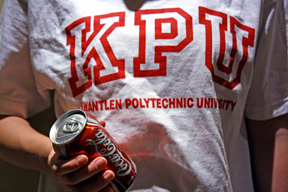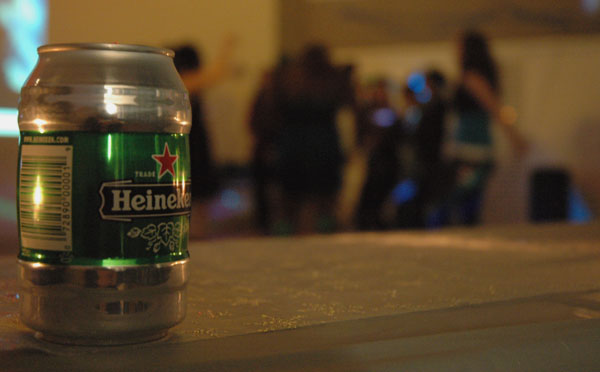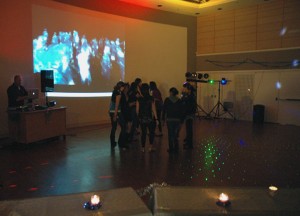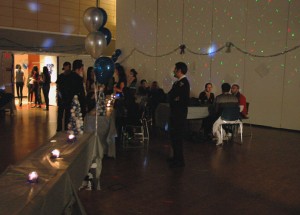Opinion: CRTC keeping Canada in tech stone-age
March 9, 2011 by Jeff Groat · Leave a Comment
At the beginning of February, the Canadian government ordered the CRTC to review its decision to allow companies to meter data usage on the internet and charge users based on the amount of data they use. The problem is the original ruling doesn’t make sense.
Data is not finite in the ways that resources such as drinking water are. Data is not something that a country or economy needs to produce, mine or refine. Data is not inherently valuable in itself, as diamonds or barrels of oil are. Data cannot be saved in times of plenty and used in times of scarcity.
Proponents of the metered data use the analogy of water. In countries where a flat rate is charged for a finite resource such as fresh water, this leads to a culture of overuse: people use as much water as they possibly can, simply because if they don’t, someone else will. It’s essentially a use-it-or-lose-it mentality that leads to waste and inefficiency.
In a way, data is the reverse of this. Unused data is inefficient and wasteful. Unused data represents an economy’s sluggishness. We can assume that the more information that’s flowing over the internet, the more valuable ideas are being exchanged and more economic growth can follow.
If the CRTC doesn’t realize that internet use will be the future of a global economy, it will put in place measures that will jeopardize any potential growth to come from inside Canada.
Technological connectedness should be a hallmark of Canadian culture. The CRTC should never again consider plans to meter use of the internet in any way.
That controversial referendum
February 7, 2011 by Brittany Tiplady · 2 Comments
Chronicle reporters Stu Gallacher and Brittany Tiplady team up for a satirical look at last week’s multipass referendum on Kwantlen’s Richmond campus. Election results are expected this week.
Privatization: A student’s perspective
January 17, 2011 by Hayley Woodin · Leave a Comment

Coca-Cola, whose products are consumed 1.6 billion times a day, won the rights to be the sole provider of beverages at Kwantlen. (Photo by Hayley Woodin)
Kwantlen cafeteria food is the product of $7.7-billion food company Sodexo, Coca-Cola earned the rights to be “the sole provider of beverages” on campus and if students want to check out books, they can do so from one of four Coast Capital libraries.
Corporate entities are visible all throughout Kwantlen, but it may not be a bad thing.
For example, when “Ahh Giver” Coca-Cola entered into a multi-year agreement with the school, one condition of the contract was that the company would be required to provide annual funding for student and faculty projects and events.
Kwantlen also received $1 million from Coast Capital Savings credit union, the largest single donation ever received, according to the school.
Last semester, Eva Botten, co-founder of the former Kwantlen club Friends 4 Food, led a campus action day against corporate involvement before the group folded. The club provided healthy meal options for students in an effort to boycott the school’s food and drink corporatization.
Despite being against the idea behind privatization, Botten could still see the positive aspects.
“Ultimately it is our campus, and if students decide that we want a better library, better this, better that and we can’t raise funds to do it on our own, then sure, bring somebody in,” she said.
“But I think there should be a somewhat equal balance between student-led organizations and [company involvement].”
The fourth-year criminology student claimed the ends don’t always justify the means, and the concept of privatizing aspects of the university can, in the long run, be detrimental to student life.
“Almost every single building has its corporate entity to it, and I don’t know when it’s going to stop,” said the club’s former advocate and cook. “I think it means the total enclosure of student grounds.
“If we want to become more of a university, I think that [university] space should at least be available for students,” she said, adding that the paperwork process involved in setting up fundraisers or display tables on campus is a major deterrent for clubs such as Friends 4 Food.
“It’s completely going to crap,” she joked, adding, more seriously, that she believes no matter what, decisions “should always be in favour of the students”.
Opinion: Lack of controversy around prayer room refreshing
December 14, 2010 by Matthew DiMera · 1 Comment
Kwantlen’s introduction of a dedicated prayer and meditation room earlier this semester was decidedly uncontroversial. Refreshingly so.
There were no public protests and no letters to the editors of the school papers complaining about the intrusion of religion into the public sphere.
The room was created in response to multiple requests from students and staff for a space to practise their respective faiths. Whether you chalk it up to typical Kwantlen apathy or an extremely enlightened outlook on faith and tolerance, the prayer room has continued to operate freely and without incident.
Compare that non-reaction to controversies generated about religious accommodations on other campuses across the country. Five years ago, McGill University in Montreal closed its prayer room and argued that a religious space didn’t belong at a secular university. Students responded by filing a complaint with the Quebec Human Rights Commission.
Admittedly, the Kwantlen prayer room is nothing to write home about. It’s the size of a very small office or cubicle and the bare concrete floor is reminiscent of a prison cell. Several groups on campus have expressed concern that the spartan room is not large enough for group prayers or other religious meetings with more than two or three people.
In response, university administrators have promised to look for new space as it becomes available, with the aim of eventually opening prayer rooms on all four campuses.
Conflicts between the secular and religious sectors continue to make headlines all over Canada. The questions of how far religious freedoms extend and what place religion has in the public square, or more specifically at a public university, aren’t going to be resolved anytime soon, but they are ones we should think about carefully.
Because what better place to foster a reasoned and educated discussion about faith than at a university?
Monster Ball dance had potential
November 15, 2010 by Lucas Meneses-Skoda · 1 Comment

Although the KSA was serving $3 Heinekens and Canadians, the turn out was poor on Nov. 9 at the Monster Ball dance, held on the Richmond Campus. (Photo by Lucas Meneses-Skoda)
By Stuart Gallacher and Lucas Meneses-Skoda
Three-dollar beers and an empty dance floor? Preposterous.
On Oct. 9, the KSA hosted a Lady Gaga-themed “Monster Ball” dance in the Conference Centre on the Richmond campus, which sadly suffered from a lacklustre crowd.
With professional lighting and a live DJ, free cans of Coke and bottled water on top of $3 cans of Molson Canadian and Heineken, the KSA did well in providing what had the potential to be a wild Tuesday night.
Perhaps students don’t see Richmond as the campus for extra-curricular activities or social events. Perhaps Kwantlen students have a poor outlook of the KSA. Either way, the effort to bring the student body together outside of class was there.
Just before Halloween, the KSA organized a similar event on the Surrey campus and filled the venue.

The event brought out few people, but for those who showed up, the 'night out' mood was still in the air. (Photo by: Lucas Meneses-Skoda).
“Well, in the end, the reason I feel a lot of people aren’t showing up is not because the promotions are wrong, it’s not because the setup is bad, it’s not because the alcohol is overly priced or anything along those lines,” said Luke Arathoon, Kwantlen’s Volunteer Co-ordinator.
“To me, personally, I think the Richmond Kwantlen campus has a different culture and a different feel to it, than say a campus like Surrey.”
Unfortunately, it seems like Kwantlen students think that “good” events can only happen at the “good” campus. For the KSA, this has become a frustrating issue. The KSA is eager to cultivate a social vibe, but it is difficult when the student body doesn’t show enthusiasm.
“I didn’t want to go, because I didn’t think anyone else was going. I didn’t want to be the only person there,” said Sarena Mann, 20, who studies general arts.
“I think [the KSA] has done a really bad job of making the Richmond campus a student community. People come here just to study and that’s it,” said Jonathan Hubele, who studies accounting.
Arathoon says that for years, students have nagged the KSA for a school dance.

Apart from the dance floor, there was a section of with tables and chairs where students could enjoy their drinks and relax. (Photo by: Lucas Meneses-Skoda).
“I think there is a big disconnect between complaining and giving valid criticism. You know, like constructive criticism, versus like ‘Oh well, the KSA doesn’t do anything for me.’”
Arathoon hopes that students will change the way they think about these events, and help to build more optimism around the campus.
If negativity leads to more negativity, then the opposite must be true as well. Essentially, the more students who approach these events with an open mind, the more likely they are to thrive.
The fact is, school is meant to be a social environment, and we’re all interested in hanging out and letting loose. So the next time there’s a dance, shindig or celebration, don’t ask questions — make a point of going with your party hat on and leaving your study cap at home.
Opinion: Increasing minimum wage makes sense
October 12, 2010 by Jeff Groat · Leave a Comment
It’s time to raise the minimum wage in B.C. — the province’s students have it hard enough.
Last month, Carole James, leader of the provincial NDP and the official opposition, raised the notion of increasing the minimum wage from $8 an hour to $10. Such a raise would take the province from having the lowest minimum wage in Canada to having one of the highest. (The minimum wage in B.C. hasn’t been increased since 2001.)
It’s important to note that Metro Vancouver has one of the highest costs of living in the country, meaning that the dollars spent on rent, groceries and utilities don’t go nearly as far as money being spent in other major Canadian cities.
None of this is lost on Canadian students. Tuition costs continue to climb (up about four per cent this year), as most full-time students continue to work part-time or take out student loans in order to support themselves. It is a common sight to see three, four or five students crammed into a small apartment or suite in any neighbourhood in Metro Vancouver, sharing the rent in one of the most expensive markets in the country.
Of course, one of the biggest arguments against increasing the minimum wage is the fact that the rise in operating costs will hit smaller businesses hardest. Opponents to the increase claim this would result in fewer jobs in the province, and in effect, make circumstances worse than they already are.
The only problem with this argument is that it is an all-too-common refrain of right-wing think tanks such as the Fraser Institute, backed up with questionable data and liberal interpretations of Statistics Canada reports.
That’s not to say that there will never be adverse effects of an increase to the minimum wage, but the effects of keeping it at a Canada-wide low of $8 are adverse enough.
Given the fact that, according to Stats Can, 59 per cent of minimum wage workers are 15 to 24 years old — a large portion of whom are students and are the future cultural, political and business leaders of the country — it is time to consider this as a sound economic investment in our future.
In fact, Ontario pays the highest minimum wage in Canada at $10.25 per hour, but remains as one of the top economic performers in the country.
It’s time to keep up with the times and raise the minimum wage in this province.
Social media: a status update
October 3, 2010 by Brittany Tiplady · 1 Comment
The halls of Kwantlen have no lack of social-media-frenzied students.
Somehow, between living and breathing, eating and sleeping, another aspect of life necessary to survival was added to the human race. Survival is no longer the primal simplicity that is lost in history textbooks, but an evolution of not only technology, but communication.
Have you noticed that people do not speak anymore? A person-to-person conversation is not kept between the lips, but thereafter spread by fingers tapping furiously on keyboards, cell phones, smart phones, iPads and — gasp — perhaps in a telephone call.
Words are spread through cyberspace, made public on Facebook and Twitter. Friday night plans are advertised on your Facebook status, and kept updated on your Twitter, and the photo taken by your iPhone is no longer a moment captured just for you, but uploaded onto the Internet so that your friends can “like” and comment and re-tweet, so that you can feel connected. Or, perhaps so that others can be jealous, or more appropriately, envious.
Cell phones aren’t just for convenient and portable communication, they’re plastic, micro-chipped, universal lifelines. iPhones, and Blackberries are an added bionic body part attached to peoples’ hands, sitting in purses or backpacks, pockets-buzzing, beeping, and ringing. Because even when you’re alone, you’re really nowhere near isolation, because that piece of plastic in your hand has the entire world compacted inside.
Blackberry Messenger isn’t an easier way to stay connected. Who are we kidding? It’s another reason to add stress, gossip and anxiety to your already caffeine-reliant life (which will also reflect on your Twitter update), because when your boyfriend reads your bbm but doesn’t answer, yet he’s on Facebook chat (which means he has to have checked his phone right?), you’re going to text your best friend, and most likely stare at that checkmark on your screen, and wait until that vibration gives you the answer you’ve been holding your breath for.
Love is no longer shown through rosy cheeks, nervous tongues and wide eyes. Love is now a plastic keyboard and human attention to a text message. And heaven forbid your crush posts photos with someone of the opposite sex, making sexy, eat-your-heart-out faces for the camera. Intimacy has somehow made a viral change from personal connection to words from keyboards, and sent flying through Internet waves, so in a matter of hours, maybe minutes, your circle of friends — and possibly a few foes — are made aware of your newest endeavor, your latest secret and what you’re having for lunch.
Maybe this sounds exaggerated. Maybe you’re one of those who chooses to stray from the addictions of social networking, and keep your business in simplistic proportions. It doesn’t matter because, everyone else around you isn’t.
Here lies the question: are we living?
If you have to have your smart phone beside you at all times, Facebook open on your laptop and your Twitter stream constantly scanned, I’d say you aren’t. You aren’t breathing air, you’re breathing cyber fumes, shared by the majority of the world’s population,.
Before we all know it, we’ll all be dead before the next status update.
Smoke up, life’s short?
September 21, 2010 by Stu Gallacher · Leave a Comment

A new bylaw went into effect on Sept. 1, prohibiting smokers from lighting up in public parks and on beaches in Vancouver — excluding Wreck Beach, of course.
In a string of initiatives to deter smoking, the new ban is just another drop in the bucket. The bucket, however, is getting pretty full. How long will it be until the right to smoke a cigarette in Vancouver is abolished?
Then again, if the impact of smoking in Vancouver is so harsh and uncompromising, perhaps there’s a greater issue at stake. Why not just make it illegal?
Smoking does appear to be falling into a category of socially unacceptable behaviour, akin to shooting heroin and smoking meth. These days, the satisfaction from inhaling a cigarette in public is rivaled by the ethical judgments of a preeminent non-smoking community.
Besides, how long would it really take for devout smokers, and casual smokers alike, to kick the habit if cigarettes were taken off the market? There’s no shortage of healthy alternatives readily available to fill the void: yoga, swimming, coffee, breathing fresh air. The list goes on. Sadly, they don’t possess all the toxic qualities cigarettes do, and are therefore significantly less attractive pastimes. But why not give it a shot?
Indeed, cigarettes have been around for eons. But change is inevitable. So rather than looking at the new bylaw as a retraction of some inherent spiritual liberty, let’s consider the possibility that the concerned, health-conscious and politically active are genuinely trying to save us from ourselves, one step at a time.
• • •
Here’s what a few students on the Richmond campus had to say about the issue:
Marianna Vilchinsky
Age: 19
Program: General studies
Smoker: Yes
“I think it’s good. If you don’t smoke, I don’t think you should be surrounded by it. But I don’t think it should be banned because it’s still your personal choice.”
Cassidy Scott
Age: 18
Program: Journalism
Smoker: No
“It’s not even politically correct to smoke.”
Kimiya Shokoohi
Age: 20
Program: Journalism
Smoker: Casual
“As a social smoker, I feel like we smoke when we’re having a good time, when we’re out at beaches, when we’re out at parks and together there. So it kind of takes away that activity. It does take away people’s right to smoke, as a smoker and as an individual. Who is anyone to tell me what I can and can’t do?”
Megan Mcnee
Age: 20
Program: Interior design
Smoker: Yes
“I think it’s getting to the point where it could be illegal, in the next decade or so. I wouldn’t say smoking is irreplaceable, but it’s better than doing hard drugs. I suppose you could get physically active, but I prefer smoking.”
Veronica Fraczyk
Age: 26
Program: Accounting
Smoker: No
“I don’t think it’s going to do much. People are going to smoke if they want to. It’s a very serious addiction, and I think they’ll find a way to get around it. I would absolutely vote to get [smoking] off the market.”


